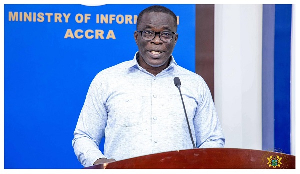The African Institute for Mathematical Sciences, Ghana (AIMS Ghana) is seeking collaboration with the Noguchi Memorial Institute for Medical Research (NMIMR), University of Ghana in the area of biomedical research.
Professor Kwadwo Ansah Koram, the Director, NMIMR, said the collaboration would aim at using their facilities and skills to address the challenges of some diseases afflicting the people.
Prof Koram made this known in his address at the opening of the Introduction to Genome-Wide Association Studies (GWAS) for complex diseases workshop in Accra. The five-day workshop is being organised by the AIMS-Ghana in collaboration with the H3AbioNet Node of the NMIMR.
AIMS is a non-profit pan-African network of Centres of Excellence enabling Africa’s talented students to become innovators, driving the continent’s scientific, educational and economic self-sufficiency.
AIMS-Ghana is a centre for education, research and outreach, located in Biriwa in the Central Region.
Operating as a partnership between African and international universities, AIMS Ghana provides an innovative and relevant curriculum within a unique 24-hour learning environment.
Prof Koram said the NMIMR was set up in 1979 in memory of Hideyo Noguchi, a prominent Japanese bacteriologist, who came to Ghana 90 years ago to research into yellow fever but unfortunately lost his life in the process.
He said NMIMR is the leading biomedical research facility in Ghana; adding that the Institute was committed to researching on national health priorities and training of biomedical scientists.
The Director said the Institute’s vision was to be a world class Institute capable of conducting high quality cutting edge research and training in the biomedical sciences.
He said the Institute, which was set up initially with the mission of researching into the control of infectious diseases but as disease patterns had changed, non-communicable diseases were being researched into.
He mentioned that currently they were working with the University of Ghana Medical School on chronic kidney diseases and cancer biology.
He said research shows that more people were dying of non-communicable diseases, hence, the need for people to adopt a healthy living lifestyle.
On the workshop, Prof Koram said it aimed at introducing an interdisciplinary audience to important concepts in genetics and population genetics that were relevant to complex disease association studies and data analysis.
He said participants would be taken through Basic Genetics and Introduction to Population Genetics, GWAS study design, Genomic Data Quality Control and Introducing to population Structure.
Others are Introduction to Admixture, Principles of Genome wide Association Studies, Genome-Wide Association Studies pipelines with plink and Genome-Wide Association Studies pipelines -inputation.
Dr Gaston K. Mazandu, the IDRC Research Chair at AIMS Ghana and South Africa, said participants were being introduced to the potential of GWAS and to key strategic considerations in designing and performing association studies for mapping disease genes.
Regional News of Thursday, 15 June 2017
Source: GNA

















